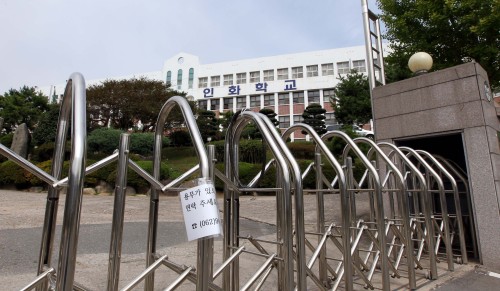Public uproar over sexual assault against disabled leads police to reopen 2005 case
A local box office hit about the true story of sexual abuse of disabled students by teachers in a special school has reignited public outrage over lenient court rulings.
It has prompted police to reopen the case, lawmakers to devise measures for the vulnerable, with some demanding the shutdown of the school, and the government to probe facilities for the disabled.
The film “Dogani” ― or “The Crucible” in English ― is a screen adaptation of a book written by Kong Jee-young in 2009. It depicts a case in which several disabled students at Gwangju Inhwa School, a special educational institution for the hearing-impaired, were raped by teachers for five years from 2000.
The astonishing case was revealed in 2005 by a teacher newly appointed to the school of 72 students with hearing difficulties. He disclosed that the headmaster had raped a girl at his office while an administrative officer groped a 22-year-old student. Another worker sexually assaulted 7 and 9-year-old boys and kissed a 9-year-old girl.
Such offenses are believed to have continued since 2000 and six teachers were accused. Nine victims came forward, but more cases were left unresolved since victims are believed to have concealed additional crimes in fear of repercussions or because of trauma.
Half of the accused were freed immediately since their cases’ statutes of limitations had expired. The local court sentenced the headmaster, the son of the school founder, to a five-year term in prison, and four others received relatively heavy penalties. But the appellate court reduced the first court decision, giving probation and a 3 million won fine for the headmaster and lighter verdicts to the rest.
 |
The main gate of Gwangju Inhwa School is closed. (Yonhap News) |
Lee Han-ju, then judge of the Gwangju High Court, said the case was settled between the victims’ parents and school management during the trials and the plaintiffs dropped the case.
“It was very frustrating for the judges and the prosecutors but sexual assaults are subject to complaint, which means that once settlement is arranged, no further penalty is sought,” he said. Two years ago, the law was revised to mandate that all sex criminals be prosecuted even if the victim didn’t press charges.
The school has survived the scandal. The victims were ousted and now are reportedly staying in shelters. But the school kept 22 students and is still receiving 1.8 billion won in state subsidies every year because local education authorities could not find a replacement facility.
The case seemed to have been forgotten by the public until last week, when the movie opened, drawing more viewers than any in the drama genre in years. Online bulletins circulated with 50,000 netizens urging the education authorities to shut down the school.
“The Inhwa tragedy is a mixture of greed, social ignorance and prejudice,” an internet user wrote in supporting the campaign. Public campaigns are moving to abolish the statute of limitation for sex crimes. Currently, it is seven years from the initial recognition.
Politicians swiftly moved to meet the public demand. The ruling Grand National Party Chairman Hong Joon-pyo on Thursday asked the lawmakers to draw up a bill allowing thorough investigations and regular audit into the management of private welfare foundations including schools.
“Rep. Chin Soo-hee will submit the relevant bill in the mean time and the lawmakers are encouraged to vote for its passage,” he said. “Sex crimes are serious crimes but are treated more leniently than other crimes. I ask the lawmakers to place extra effort on imposing heavy penalties on sex offenders.”
The police vowed to look into systematic problems of the school. The National Police Agency dispatched special investigators to the school to check on a wide range of issues including human rights infringement and possible account fraud.
The Ministry of Health and Welfare announced that it will conduct a crackdown on 119 unregistered or private-run welfare facilities for disabled persons nationwide next month. The ad-hoc investigative body will be comprised of civil servants, civic activists, public officials and journalists.
“We will also submit a bill to enhance transparency of the relevant private foundations,” said Ko Kyung-suk, a ministry official, at the press briefing Thursday.
The Gwangju Metropolitan Office of Education said it is considering shutting down the school and is studying the legal grounds.
By Bae Ji-sook (
baejisook@heraldcorp.com)








